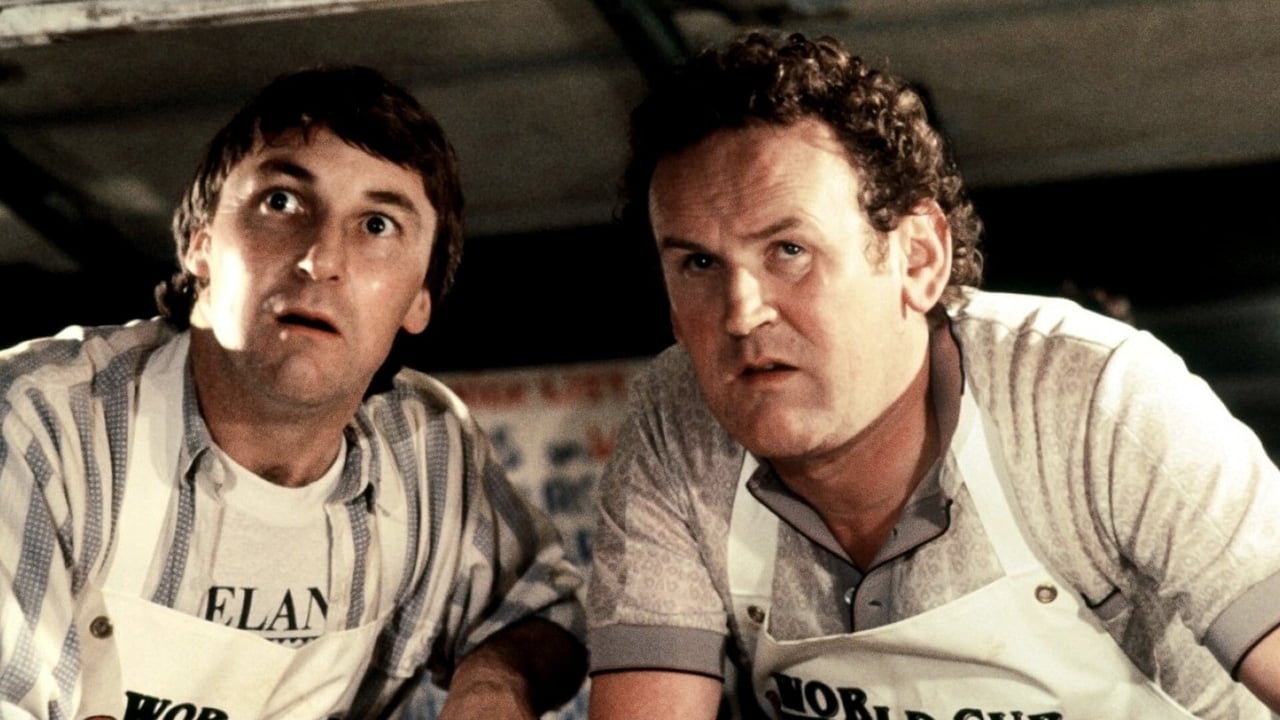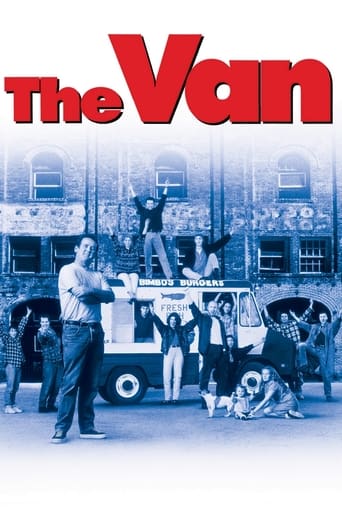

It's November 1989. Bimbo (Donal O'Kelly) is fired from the bakery. His best mate Larry (Colm Meaney) is struggling with only welfare for the coming Christmas. Bimbo is about to consider a MacDonald McJob when the guys are shown a food van. It's a piece of junk that doesn't even have an engine. Bimbo's wife buys the van and he invites Larry to join him selling fish and chips. Their chips van does smashingly as Ireland advances in the World Cup.It's a steady decline from 'The Commitments' to 'The Snapper' and then to this. A more direct connection would have been better but I'm not an entertainment lawyer. It's still a fun watch. Donal O'Kelly doesn't have the screen presence. Colm Meaney is back and he overshadows everybody else. The trick is to make these poor losers lovable. Colm Meaney has that in spades. It would be better for them to get a steady young kid as their third. The relationship in the van is where this movie could have excel more. The guys' friendship could be more likable. I especially didn't like them picking up the ladies at the bar. Even their bickering could have been done with a lighter touch. Nevertheless it's still a fun ride.
... View MoreIn November 1989, in Ireland, the baker Bimbo (Donal O'Kelly) is fired from his job and he does not feel comfortable with the situation. His best friend Larry (Colm Meaney), who is also unemployed and living with his low welfare with his wife Mary (Caroline Rothwell) and their children, is resigned with his situation and tries to console his friend. But Bimbo is supported by his wife Maggie (Ger Ryan) and decides to buy an abandoned van without engine in a junkyard to open a business of hamburger, French fries and fried codfish and invites Larry to work with him. Soon they have financial success but their friendship is compromised."The Van" is a dramatic comedy directed by Stephen Frears that has a funny and exciting beginning and an unpleasant conclusion. The friendship of Larry and Bimbo is beautiful to see and their success is what every viewer expects to see. However, the final twist with the attitude of the big-mouth and envious Larry is disappointing. Maybe the bitter story is more realistic this way but I would prefer a happy ending, valuating friendship and hard work. My vote is five.Title (Brazil): "A Van" ("The Van")
... View MoreA friend of mine said that this is a feel good movie. It makes you feel good that your life does not suck as much as theirs does. This is a very interesting movie as it is about mateship. Two men loose their jobs and find a rotting van which they salvage and turn into a chip van. They have absolutely no idea as to how to run a such a van, but do so anyway. The movie looks at how they struggle through their mateship in relation to the van.Larry (Colm Meanly) is a big mouthed know it all. It is his character that the movie is based around and he steals the scene in most of the movie. Bimbo is the owner of the van but he is pushed to the side with Larry's almost dominant character. The movie looks at the struggle that they go through and how their friendship begins to disintegrate with the van. Larry acts constantly without consulting Bimbo and this angers him greatly. Twice he hires family without even saying anything to Bimbo.There isn't much in the way to comment on this film for it really looks at life of two people in Ireland in the early '90's. Much of the things come out of the two characters and how we watch the friendship fall apart. It is an interesting movie in the way a couple of things are conducted, such as when the van is rolled back to Bimbo's house and a huge crowd follows them, signifying a new start to their seemingly meaningless life.Much of the trouble can be seen with the way Larry treats the privilege of working with Bimbo in the van. He is stubborn and sulks. When given a wage he begins to play union with Bimbo. He treats customers with disrespect and finds himself in trouble numerous times. We shouldn't feel good that our life is not like theirs, but rather look at them and learn about how we are responsible for what happens to us. We shouldn't go pushing others around and then complain that they don't like us, rather we should just not push others around, and if we do, then accept the consequences.
... View MoreI love movies set in Ireland and Colm Meaney is great. This is a fun movie, with humor and an interesting angle on life in Ireland. Colm was in another movie made from this author's work, The Snapper, and that was a howler. This movie is a must for fan's of Irish movies.
... View More